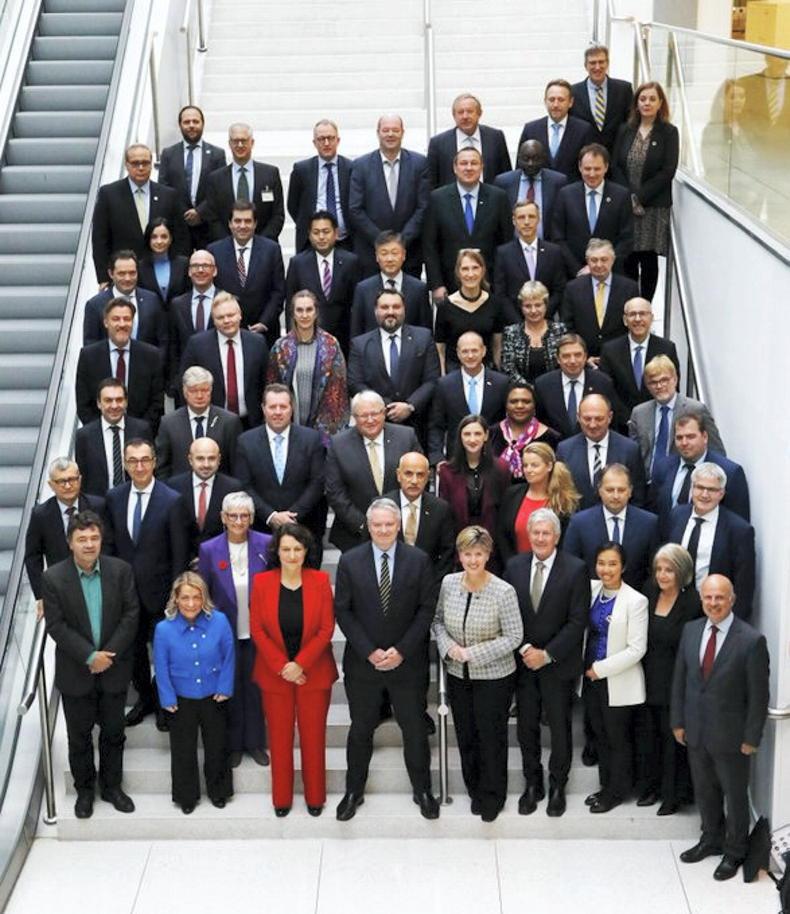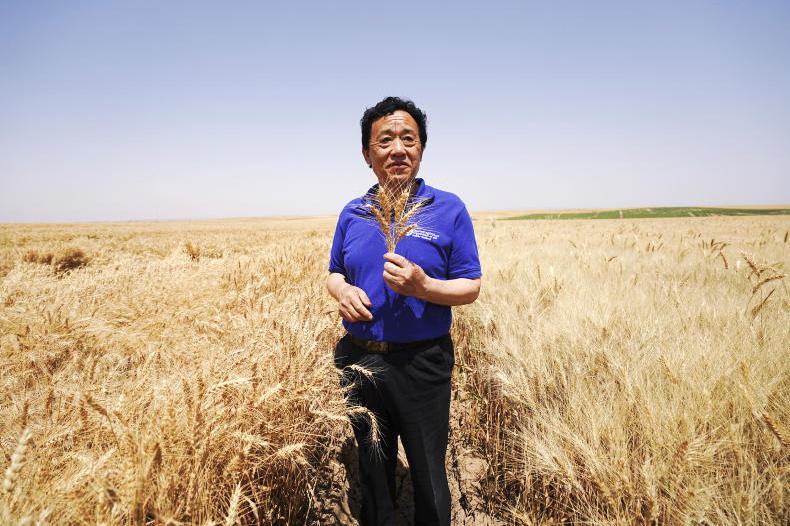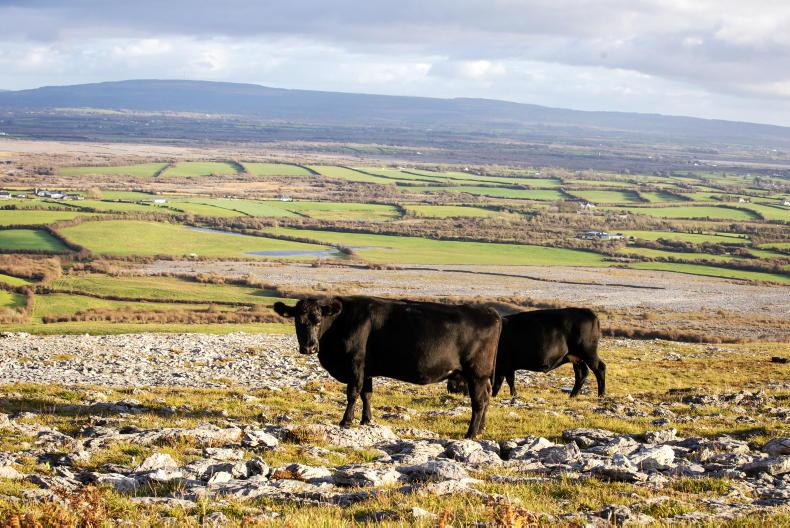Agriculture ministers from Organisation for Economic Co-operation and Development (OECD) countries met last week in Paris for the first time in six years.
The meeting came at a particularly key moment for agriculture given heightened food security challenges and the growing need for a sustainable transition across all sectors as a result of accelerating climate change.
The outcome is a declaration on transformative solutions for sustainable agriculture and food systems, which was signed by participating countries including Ireland, the EU, US, New Zealand and Australia among others.
It underlines the key role of developing transformative and innovative policies towards more sustainable and resilient agriculture and food systems.

OECD meeting of agriculture ministers.
It calls on signatories to develop and implement coherent whole-of-government policy packages, promote inclusive processes, increase investment in research and development and infrastructure, enhance research collaboration and knowledge sharing, strengthen international co-operation, strengthen the contribution of trade to agriculture and food systems transformation and develop measures for local, national and global food systems.
Black Sea initiative welcomed
The grouping condemned Russia’s “unjustified, unprovoked and illegal war or aggression against Ukraine” and recognised the severe risks that the war poses to global food security.
The Black Sea grain initiative was welcomed as an important contribution to global food security.
Strengthening sustainability and ensuring inclusive livelihoods
The detail of the declaration is familiar territory for most Irish farmers at this point. Much of the specific commitments within are already being addressed by European or domestic policy as it impacts on farmers.
Increasing climate change mitigation by reducing emissions from agriculture and food systems and effectively increase carbon sequestration to contribute to the goal of net-zero by 2050 is a key objective.
The signatories commit to reducing the negative environmental impacts of livestock production while also working together to halt and reverse forest loss and land degradation while delivering sustainable agricultural development and promoting inclusive rural transformation.
It also commits to increasing efforts to reorient agricultural policy to a more sustainable agriculture. The concept of just transition, while not explicitly detailed, is certainly nodded to in terms of tackling adjustment challenges and promoting opportunities for those whose livelihoods are affected.
The signatories also commit to tackling the labour challenges across the entire supply chain, along with other commitments focused on inclusivity.
Environmental activists and those steering global climate change policy have become increasingly critical of public declarations and commitments which they say are not being back up.
In focus in the past week have been those commitments of financial support to developing countries to support their climate adaption which are not being backed up in negotiations.
However, farmers too, particularly in Europe and Ireland, grow weary of international agreements and commitments at a time when they appear to be transforming at a much more accelerated pace than some global counterparts.
The need to transform agriculture is real. However, the fear is that Europe creates another external dependency down the road – this time in food, which would leave the continent vulnerable.
Climate justice and just transition are keystone concepts in climate change. However, the fact that developed countries are not honoring commitments to developing countries that are being transformed by the impact of climate change does not bode well.
Farmers will rightly ask - when the rubber hits the road, do these international commitments level the playing field, ensure climate justice for those who lose out and do anything to ensure that farms are sustainable in the future?
Agriculture ministers from Organisation for Economic Co-operation and Development (OECD) countries met last week in Paris for the first time in six years.
The meeting came at a particularly key moment for agriculture given heightened food security challenges and the growing need for a sustainable transition across all sectors as a result of accelerating climate change.
The outcome is a declaration on transformative solutions for sustainable agriculture and food systems, which was signed by participating countries including Ireland, the EU, US, New Zealand and Australia among others.
It underlines the key role of developing transformative and innovative policies towards more sustainable and resilient agriculture and food systems.

OECD meeting of agriculture ministers.
It calls on signatories to develop and implement coherent whole-of-government policy packages, promote inclusive processes, increase investment in research and development and infrastructure, enhance research collaboration and knowledge sharing, strengthen international co-operation, strengthen the contribution of trade to agriculture and food systems transformation and develop measures for local, national and global food systems.
Black Sea initiative welcomed
The grouping condemned Russia’s “unjustified, unprovoked and illegal war or aggression against Ukraine” and recognised the severe risks that the war poses to global food security.
The Black Sea grain initiative was welcomed as an important contribution to global food security.
Strengthening sustainability and ensuring inclusive livelihoods
The detail of the declaration is familiar territory for most Irish farmers at this point. Much of the specific commitments within are already being addressed by European or domestic policy as it impacts on farmers.
Increasing climate change mitigation by reducing emissions from agriculture and food systems and effectively increase carbon sequestration to contribute to the goal of net-zero by 2050 is a key objective.
The signatories commit to reducing the negative environmental impacts of livestock production while also working together to halt and reverse forest loss and land degradation while delivering sustainable agricultural development and promoting inclusive rural transformation.
It also commits to increasing efforts to reorient agricultural policy to a more sustainable agriculture. The concept of just transition, while not explicitly detailed, is certainly nodded to in terms of tackling adjustment challenges and promoting opportunities for those whose livelihoods are affected.
The signatories also commit to tackling the labour challenges across the entire supply chain, along with other commitments focused on inclusivity.
Environmental activists and those steering global climate change policy have become increasingly critical of public declarations and commitments which they say are not being back up.
In focus in the past week have been those commitments of financial support to developing countries to support their climate adaption which are not being backed up in negotiations.
However, farmers too, particularly in Europe and Ireland, grow weary of international agreements and commitments at a time when they appear to be transforming at a much more accelerated pace than some global counterparts.
The need to transform agriculture is real. However, the fear is that Europe creates another external dependency down the road – this time in food, which would leave the continent vulnerable.
Climate justice and just transition are keystone concepts in climate change. However, the fact that developed countries are not honoring commitments to developing countries that are being transformed by the impact of climate change does not bode well.
Farmers will rightly ask - when the rubber hits the road, do these international commitments level the playing field, ensure climate justice for those who lose out and do anything to ensure that farms are sustainable in the future?










SHARING OPTIONS